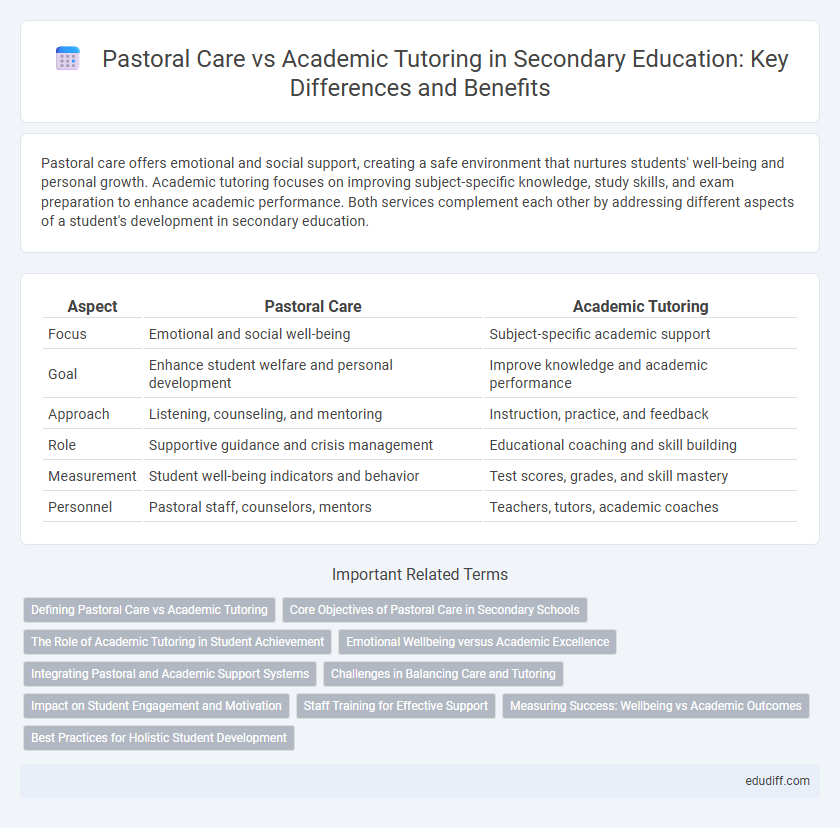Pastoral care offers emotional and social support, creating a safe environment that nurtures students' well-being and personal growth. Academic tutoring focuses on improving subject-specific knowledge, study skills, and exam preparation to enhance academic performance. Both services complement each other by addressing different aspects of a student's development in secondary education.
Table of Comparison
| Aspect | Pastoral Care | Academic Tutoring |
|---|---|---|
| Focus | Emotional and social well-being | Subject-specific academic support |
| Goal | Enhance student welfare and personal development | Improve knowledge and academic performance |
| Approach | Listening, counseling, and mentoring | Instruction, practice, and feedback |
| Role | Supportive guidance and crisis management | Educational coaching and skill building |
| Measurement | Student well-being indicators and behavior | Test scores, grades, and skill mastery |
| Personnel | Pastoral staff, counselors, mentors | Teachers, tutors, academic coaches |
Defining Pastoral Care vs Academic Tutoring
Pastoral care focuses on the holistic well-being of students, addressing their emotional, social, and mental health needs to create a supportive learning environment. Academic tutoring centers on enhancing students' subject-specific knowledge and skills through targeted instruction and personalized academic support. The distinction lies in pastoral care prioritizing personal development and emotional support, while academic tutoring emphasizes cognitive improvement and educational achievement.
Core Objectives of Pastoral Care in Secondary Schools
Pastoral care in secondary schools centers on students' emotional wellbeing, social development, and mental health support, aiming to create a safe and nurturing environment. Core objectives include fostering resilience, promoting positive relationships, and addressing personal challenges that may affect academic performance. This holistic approach prioritizes the overall welfare of students beyond academic achievement, contrasting with the targeted skill improvement focus of academic tutoring.
The Role of Academic Tutoring in Student Achievement
Academic tutoring plays a crucial role in enhancing student achievement by providing personalized support tailored to individual learning needs and addressing specific academic challenges. Targeted tutoring interventions improve comprehension, boost confidence, and foster critical thinking skills essential for academic success. Data shows that regular tutoring sessions correlate with higher test scores, increased homework completion rates, and overall improved student performance across diverse subjects.
Emotional Wellbeing versus Academic Excellence
Pastoral care emphasizes fostering students' emotional wellbeing through supportive relationships and mental health resources, which enhances overall personal development and resilience. Academic tutoring concentrates on improving students' subject-specific knowledge and skills, driving academic excellence and higher performance outcomes. Balancing pastoral care with tutoring creates a holistic educational environment that nurtures both emotional health and intellectual achievement.
Integrating Pastoral and Academic Support Systems
Integrating pastoral care with academic tutoring enhances student well-being and learning outcomes by addressing emotional, social, and educational needs simultaneously. Schools implementing combined support systems report improved student engagement, reduced absenteeism, and higher academic achievement. Effective collaboration between counselors and tutors creates a holistic approach that fosters resilience and academic success.
Challenges in Balancing Care and Tutoring
Balancing pastoral care with academic tutoring presents challenges such as time constraints and competing priorities, which can hinder effective support for students' emotional and educational needs. Educators must navigate the delicate task of addressing mental health concerns while delivering curriculum content, often without sufficient training in either area. This dual responsibility can lead to burnout and reduced efficacy unless schools implement integrated strategies and professional development to support holistic student development.
Impact on Student Engagement and Motivation
Pastoral care fosters a supportive environment that significantly enhances student engagement by addressing emotional well-being and social challenges. Academic tutoring improves motivation through personalized learning strategies that target individual academic needs and promote skill mastery. Integrating both approaches creates a holistic support system, driving sustained student commitment and achievement.
Staff Training for Effective Support
Staff training in pastoral care emphasizes emotional intelligence, active listening, and empathy to address students' well-being, whereas academic tutoring training focuses on subject mastery, instructional strategies, and assessment techniques to enhance learning outcomes. Effective support staff development integrates both approaches, ensuring educators can respond to students' holistic needs while promoting academic success. Institutions prioritizing comprehensive training demonstrate improved student engagement, mental health, and performance metrics.
Measuring Success: Wellbeing vs Academic Outcomes
Pastoral care emphasizes measuring success through improved student wellbeing, emotional resilience, and social development, reflecting a holistic approach to education. Academic tutoring focuses on quantifiable academic outcomes such as grades, test scores, and knowledge retention to evaluate effectiveness. Both approaches contribute to student success, but pastoral care prioritizes mental health indicators while academic tutoring centers on cognitive achievement metrics.
Best Practices for Holistic Student Development
Effective pastoral care fosters emotional well-being and social skills, while academic tutoring enhances cognitive abilities and subject mastery; integrating both ensures comprehensive student support. Tailoring interventions based on individual student needs promotes resilience, motivation, and academic success. Collaboration between pastoral staff and tutors creates a balanced environment addressing mental health and learning outcomes simultaneously.
Pastoral Care vs Academic Tutoring Infographic

 edudiff.com
edudiff.com